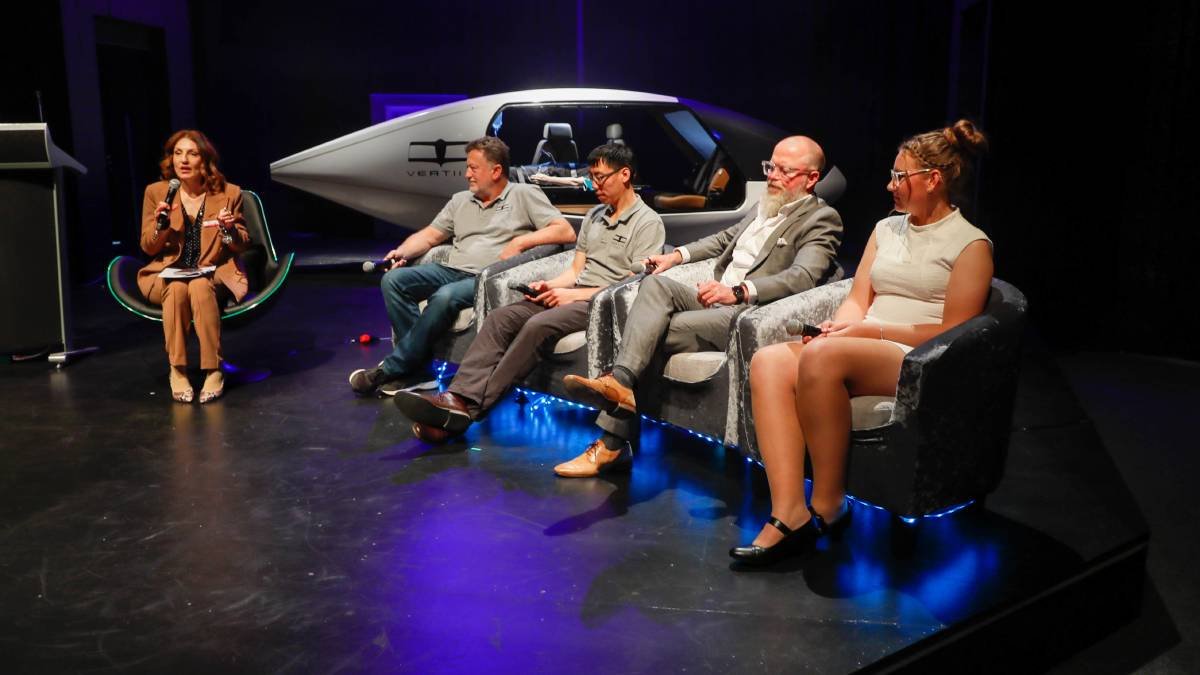Wagga: Beyond 2050 presented new possibilities for regional future
Written by Dan Holmes - article originally published by the Daily Advertiser here.
3 August 2023
Strategy manager for Vertiia Russell Hoore and the Vertiia flying car. Picture by Les Smith
A new way to dodge potholes and cross floodplains with ease has landed in Wagga.
A model "flying car" was the centrepiece of Wagga: Beyond 2050 - a series of presentations and discussions to prime the pump for the digital future in the regions.
Vertiia's model flying car would operate similarly to an oversized drone, using a mixture of electric motors and hydrogen propulsion.
Vertiia Strategy manager Russell Hoore said he thinks the vertical take off and landing craft could be commercially available in three years.
"We're working with CASA [Civil Aviation Authority] to help them try to identify experts who can then - dare I say - peer review what we're doing," he said.
"We're working with CASA to get them to certify this by 2026.
"That will mean commercial operators can start to buy them, training their staff on flying and repairing them."
This doesn't mean it would be available for individuals though. Mr Hoore said while there are a lot of advantages to airborne vehicles, low cost isn't one of them.
He envisions Vertiia craft being used by emergency services first, then maybe a rideshare-like service in the future.
"I don't think they'll be at a price point for individual ownership. I think they'll be more at a price point for a share type operator ... a bit like a charter service does now"," he said.
"We think firefighting will be one of the earlier uses, because the idea of putting a pilot above a fire ... do you really need to have a pilot above a fire?
"I think we're doing something good for the world. We're decarbonising, creating sovereign capability in Australia ... it's better than selling cigarettes or something."
Emily McMahon gives the youth perspective at Wagga: Beyond 2050. Picture by Les Smith
Mr Hoore said with solar panels springing up around the Riverina, Wagga would be a near perfect test case - large distances to travel, and the capacity to produce green hydrogen locally.
While Vertiia stole the show, they weren't alone in looking at ways to better support emergency services.
Co-founder of digital training developers EmergiSim Mick Byrne was raised in Wagga, and is no stranger to the challenges faced by emergency services here during natural disasters.
EmergiSim's systems would offer ways for first responders to refine their response to large scale problems like floods, or terrorist attacks that are hard to simulate in the real world.
It uses Unreal Engine - the same technology used to create video games - to immerse trainees in a virtual reality space, where they test their skills in an overwhelming environment.
Mr Byrne said he'd like to see Wagga become a regional hub for digital infrastructure.
"The biggest need we found straight away was for first responders dealing with large scale mass casualty incidents that are super expensive to stage, and super difficult to repeat," he said.
"The problem with skills is if you don't use them you lose them, and we want our first responders capable, confident and resilient, which means they need to be practising these skills on a regular basis.
"If I can give you the ability to fail safely in simulation, to repeat and learn from your mistakes, you'll be much more capable, and deliver better care to your patients."
Panel discussion at Wagga: Beyond 2050, featuring moderator Gioia Gianniotis, Russell Hoore and Andrew Gong from Vertiia, Telstra's Kim Krogh Anderson, and youth panelist Emily McMahon. Picture by Les Smith



